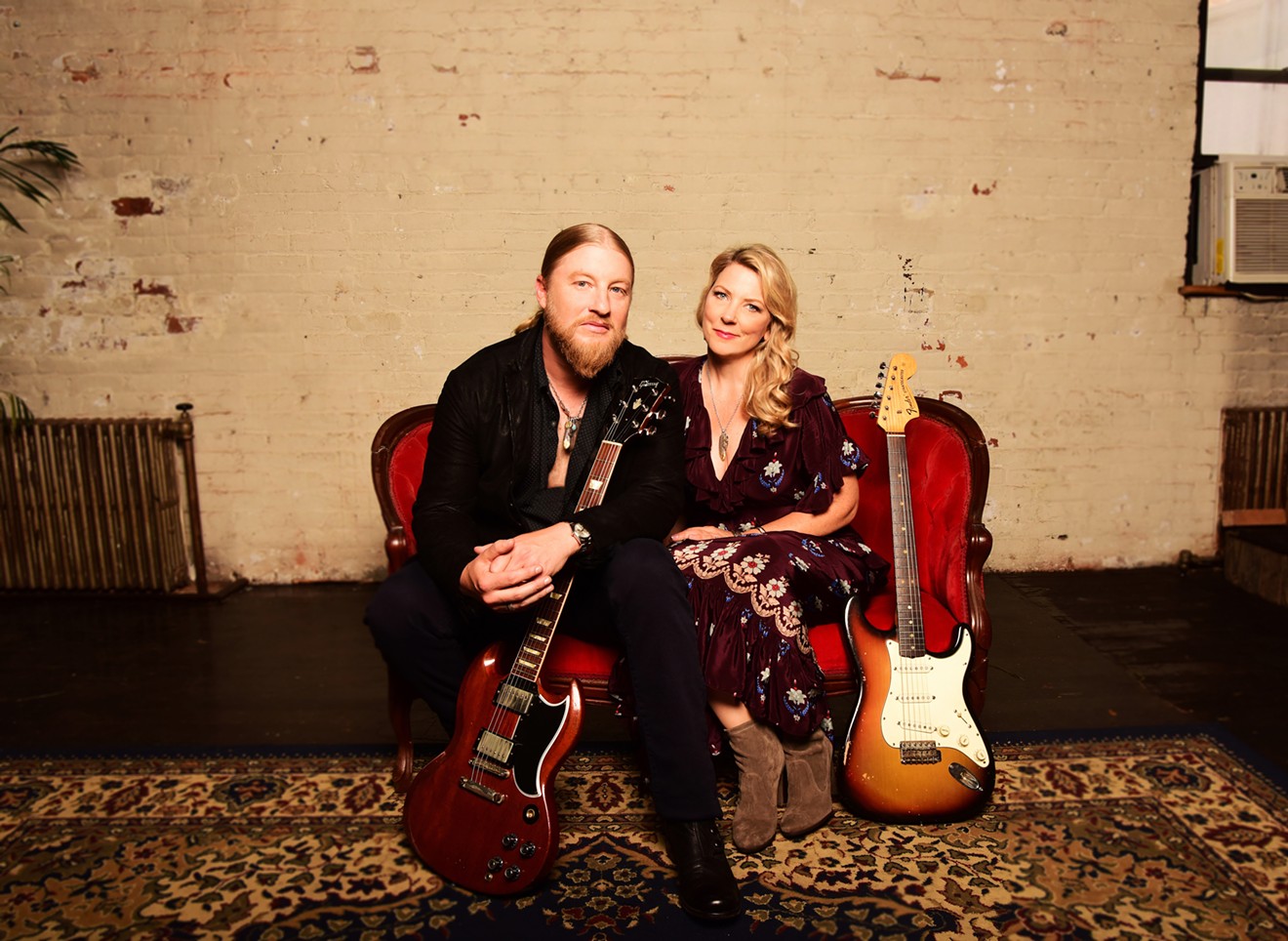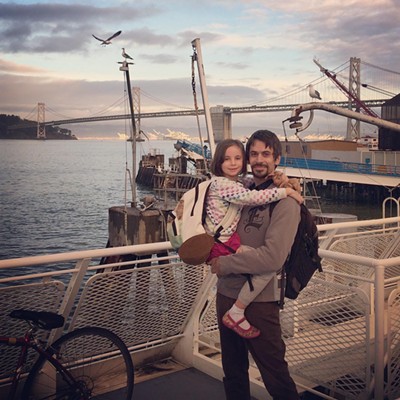Never a Cover Band: Derek Trucks on Looking Forward
Derek Trucks, the nephew of Allman Brothers drummer Butch Trucks, is returning to Red Rocks with the Tedeschi Trucks Band.
By Adam Perry
July 17, 2019

The Tedeschi-Trucks Band brings its husband-and-wife team to Red Rocks July 26 and 27.
Shervin Lainez
[
{
"name": "Air - MediumRectangle - Inline Content - Mobile Display Size",
"component": "12017618",
"insertPoint": "2",
"requiredCountToDisplay": "2"
},{
"name": "Editor Picks",
"component": "17242653",
"insertPoint": "4",
"requiredCountToDisplay": "1"
},{
"name": "Inline Links",
"component": "18838239",
"insertPoint": "8th",
"startingPoint": 8,
"requiredCountToDisplay": "7",
"maxInsertions": 25
},{
"name": "Air - MediumRectangle - Combo - Inline Content",
"component": "17261320",
"insertPoint": "8th",
"startingPoint": 8,
"requiredCountToDisplay": "7",
"maxInsertions": 25
},{
"name": "Inline Links",
"component": "18838239",
"insertPoint": "8th",
"startingPoint": 12,
"requiredCountToDisplay": "11",
"maxInsertions": 25
},{
"name": "Air - Leaderboard Tower - Combo - Inline Content",
"component": "17261321",
"insertPoint": "8th",
"startingPoint": 12,
"requiredCountToDisplay": "11",
"maxInsertions": 25
}
]
Derek Trucks has been a rock legend since he was a teenager in an Atlanta Braves cap slaying “Layla” and nodding to Duane Allman, the late co-lead guitarist for the Allman Brothers, the soulful Southern-rock group that Duane and his brother, Gregg, founded with Derek’s late uncle, drummer Butch Trucks, in 1969. Now forty, Derek has played guitar with everyone from Buddy Guy and B.B. King to Bob Dylan and Eric Clapton; he became an official member of the Allman Brothers at just twenty years old.
The Derek Trucks Band formed when Derek was fifteen, and that outfit tackled everything from blues rock and psychedelia to Miles Davis, whose Kind of Blue was a huge influence on the modal jams of the Allman Brothers. Since 2010, Trucks has embraced writing, recording and performing powerful originals with the supremely talented singer and guitarist Susan Tedeschi — who’s also his wife — in the Grammy-winning Tedeschi Trucks Band.
We caught up with Derek in his hotel room in St. Petersburg the morning after the second show of the ongoing Tedeschi Trucks tour, which lands at Red Rocks on July 26 and 27.
Westword: What are your earliest memories of Red Rocks?
Derek Trucks: I think the first time I was at Red Rocks was my first gig as a member of the Allman Brothers Band, June of 1999. That was a pretty intense day to begin with: first gig with a legendary band, so all your senses are wide open. It’s just a special place, obviously; it’s one of those venues that any music fan has on their bucket list of places to go. It’s always amazing playing it. It’s not always the easiest to play, because you’re dealing with the elements, and the sound will travel with the wind. But when you get a great night there, there’s nothing quite like it.
For so long, you were known as the prodigy, the kid. When do you become the elder statesman?
I think it’s fast approaching [laughs]. It’s a funny thing...I started touring at nine or ten years old, and for the first ten, fifteen, almost twenty years of your career, you’re the youngest guy on stage and the youngest guy in the room. There’s certainly a point where that changed, and to me, it was this band. This was the first band I was ever in where there was anyone younger than me. That was the first awareness that you’re getting older. We’ve been doing it long enough with my solo band, and now this group, that you start seeing players or bands sometimes, and you go, “Wait, I know where that influence came from; that’s something that maybe we were doing.” So that’s a weird feeling, but you’re always trying to look forward and get better at what you do. Even though you’re not the youngest guy in the room anymore, you’re still all in it, trying to perfect your craft, and you never slow down.
You could be a sideman in literally any tribute band, like Dead and Company or whatever. How much does it mean to you to find success making original music?
It’s a totally different feeling. It’s more work, and it’s harder work, but it’s more rewarding. And saying that, I was in the Allman Brothers for fifteen years or so, and I did the Clapton gig; those are opportunities that when they come up — especially when you’re twenty years old and just gettin’ crankin’ — those are things you just can’t not do. For me, that music was the reason I started playing, so it was an incredible honor. But the whole time, I always had my solo band. I never stopped trying to create something on my own, but I felt like the Allman Brothers being family, it was something that in a lot of ways I had to do. I mean, glad to do and honored to do, but had to do. It was just part of your DNA and kind of written into your story, and that was incredible. But when I felt like it was time to step away, I had to fully step away. The thing with the Clapton gig — it lasted a year, but it was just...I was named after his record [Derek and the Dominos], so it was something that had to happen, and you learn a lot from people like that. When you do step away from those things, I can’t imagine doing it again.
We’re well down the road with where we are and what we’re trying to do. It’s a pretty solid following, and it’s the first time I’ve ever looked in the crowd and said, “Wow, they know all the words to the tunes we’ve written.” For so many years, we were playing in clubs, trying to win over however many people there are. Every night you felt like you had to get on stage and battle. It’s a different feeling now, not having to convince people the same way. It puts it in a different head space; the band can settle in and get down to business a little quicker.
Times have really changed for the better. Can you imagine one of the guys in the Allman Brothers back in the day inviting his wife to be in the band?
I don’t…you know…probably not [laughs]. That was a different era when those guys came up, and they were all fuckin' insane in the late ’60s, early ’70s. But shit, if one of ’em had married someone who sang and played like Sue, I’ll bet they would’ve thought about it. I mean, Duane and Gregg were brothers, so it was a similar thing with family, but they were always around Delaney and Bonnie — you know, husband-and-wife teams. It’s a rare couple where you have two people who are operating on the same level musically. Same with Duane and Gregg, where it wasn’t like one was there because they were brothers; they were there because they were both badasses. So Sue has something where we’d be lucky to be in her band.
Your guitar style is famously lyrical. What’s the musical conversation like when you’re on stage with your partner, who also has a lot to say with her lyrics?
One, you have to be the right partner, the right bandmate, conversationally. I’ve always wanted to be in a band with a great singer, and I was lucky to find Mike Mattison [for the Derek Trucks Band]; he’s still with us now [as a backup singer and guitarist]. Growing up listening to the Allman Brothers, that’s what set them apart; they had two great guitar players [Duane Allman and Dickey Betts], but Duane was super-lyrical. And then his brother, Gregg, was one of the great rock/soul singers of all time. To me, it’s an unbeatable combination when you have both, and I think they push each other.
Certainly with Sue, she’s such a great singer and can command that part so strongly and deliver a lyric that when it’s time to take a solo, you’re thinking about the thing; you’re thinking about what the tune is about.
Now that there is no Allman Brothers Band, do you feel a responsibility to carry on that legacy?
In some sense. I mean, there’s a lot of family of the Allmans out there doing it. Gregg and Dickey’s kids are out there touring together, and Warren [Haynes] certainly carries the mantle in a lot of ways. There’s definitely certain parts of that energy and that spirit that I can’t help think about and can’t help but incorporate into what we do and who I am as a player and as a bandleader.
That legacy is definitely on stage every night. But I think what makes a band great is that you’re not trying to be someone else ever. At no point do you want it to become nostalgic; you never want to be a cover band for anybody. If you’re keeping that legacy alive, it’s gotta be living and breathing. If you’re playing that music, it’s gotta be because you’re playing it well, not because people wanna hear it. We take that very seriously. We definitely think about it. And it’s been that way with a lot of our heroes that we’ve been on the road with and really got to really connect with.
B.B. King wanted people to carry the torch. He wanted people to keep that music alive, and he would talk about it. We’d hang out backstage, and he would talk about, “You know what? There’s not that many people that really know what this is and know what it means and have the ability to carry it.” He would talk to Sue and me about [how] it’s important to do it. And you think about all those guys. We knew it was important, but now you’re part of the lineage and part of the story. It has to grow; it has to evolve and change, but you’re all part of the same source when it gets good.
Tedeschi Trucks Band
7 p.m. July 26 and 27, Red Rocks Amphitheatre, 18300 West Alameda Parkway, Morrison, $45 and up.

KEEP WESTWORD FREE...
Since we started Westword, it has been defined as the free, independent voice of Denver, and we'd like to keep it that way. Your membership allows us to continue offering readers access to our incisive coverage of local news, food, and culture with no paywalls.
You can support us by joining as a member for as little as $1.
Pittsburgh native Adam Perry is a cyclist, drummer and University of Pittsburgh and Naropa University alum. He lives in Boulder and has written for Westword since 2008.
Contact:
Adam Perry
Follow:
Twitter: @deathorglory80
Instagram: @adamvsthevolcano


Newsletter Sign Up
Enter your name, zip code, and email
I agree to the Terms of Service and
Privacy Policy
Sign up for our newsletters
Get the latest
Music news,
free stuff and more!
Trending
Use of this website constitutes acceptance of our
terms of use,
our cookies policy, and our
privacy policy
Westword may earn a portion of sales from products & services purchased through links on our site from our
affiliate partners.
©2024
Denver Westword, LLC. All rights reserved.
Do Not Sell or Share My Information
Do Not Sell or Share My Information








